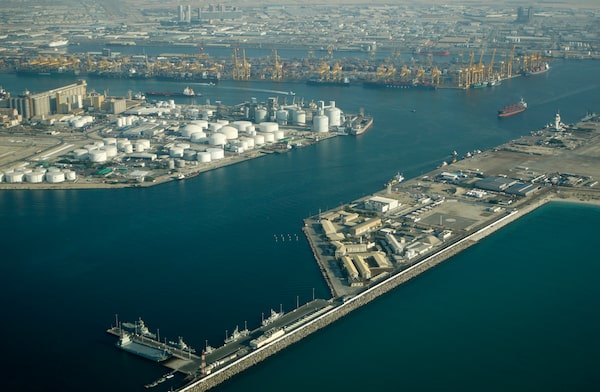
A ship leaves the Jebel Ali harbour about 40 kilometres south of Dubai, on Jan. 3, 2010. DP World said on June 6 that it sold a stake in its home base, the Jebel Ali Port, and other flagship assets to Caisse for US$5-billion.Kamran Jebreili/The Associated Press
Dubai’s state-owned logistics giant DP World is selling stakes in the city’s port and two other prized assets to Caisse de dépôt et placement du Québec as the pension fund manager expands its reach further outside Canada.
Montreal-based Caisse de dépôt will invest US$5-billion in Dubai’s port, the Middle East’s largest, as well as two industrial zones, the pension fund said in a joint statement on Monday with DP World. Other investors will also be invited to buy in, up to a maximum of US$3-billion, with all transactions expected to close by the end of the year.
Under the deal, the Caisse is investing US$2.5-billion in equity in the Jebel Ali port, the Jebel Ali Free Zone and the National Industries Park through a new joint venture in which it will hold a stake of about 22 per cent. The pension fund is investing another US$2.5-billion in debt.
The agreement highlights a willingness by governments in the Persian Gulf to offer international investors the opportunity to buy state assets as a way to bolster their finances. For the Caisse, it underscores its unrelenting push overseas. About three quarters of the pension fund’s assets are now invested outside Canada, up from 41 per cent a decade ago.
“We welcome this opportunity to invest in a best-in-class group of infrastructure that provides CDPQ with exposure to new fast-growing markets and trade routes in Africa and South Asia,” Emmanuel Jaclot, executive vice-president and head of infrastructure at the Caisse, said in the statement.
Caisse bows out of Montreal light rail project
DP World is the world’s fifth-biggest marine port operator, according to a recent investor presentation, and a major provider of end-to-end supply chain infrastructure. It has the largest logistics network in India, with a global footprint stretching over six continents. The company has pushed aggressively into East Africa in recent years.
The Caisse has had a relationship with DP World since 2016, when the two partners announced they would create a US$3.7-billion alliance to invest in ports and terminals outside the United Arab Emirates. The pension fund took a 45-per-cent stake in two DP World container terminals in Vancouver and Prince Rupert to kick off the partnership.
Four years later, in 2020, the partners said they would pour another US$4.5-billion into their pact. Together, they’ve made investments in 12 ports and terminals in five countries so far, including Chile, Indonesia and Australia.
This new deal gives Caisse valuable capital in the heart of the DP World empire – its home UAE base. The Jebel Ali port is the region’s busiest container-handling site, and helped shape Dubai into a hub for global trade. Meanwhile, the Jebel Ali Free Zone is one of Dubai’s key economic development drivers, a 57-square-kilometre site where companies can sort and assemble products without the complications of clearing customs.
DP World is now a wholly owned subsidiary of Dubai World, a government investment company. In early 2020, Dubai delisted the state-controlled company as it sought to pay back debt owed by the parent company amid an economic slowdown triggered by the 2014 collapse in oil prices and geopolitical turmoil.
The deal achieves DP World’s objective of reducing its leverage to below four times net debt-to-earnings before interest, taxes, depreciation and amortization, chief executive officer Sultan Ahmed Bin Sulayem said in the statement. “We believe this new partnership will enhance our assets and allow us to capture the significant growth potential of the wider region,” he said.
With a report from Associated Press
Your time is valuable. Have the Top Business Headlines newsletter conveniently delivered to your inbox in the morning or evening. Sign up today.